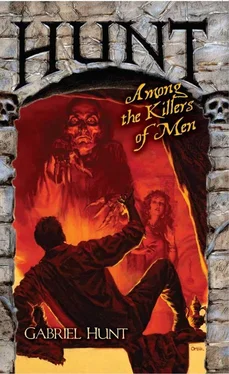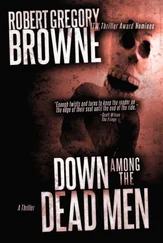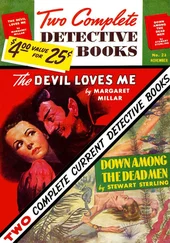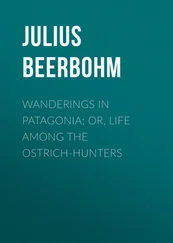“Zhang and the Tong leaders will expect treachery,” murmured Sister Menga, not looking up from her steaming chalice of entrails.
“We shall be allies,” said Cheung, making the knot in his necktie hard as a walnut. He was clad in his conventional businesswear, augmented by the sort of veneered body armor Ivory had favored.
“You are children in a nursery, squabbling over toys,” said Sister Menga. Each of her pronunciations seemed to issue from the haze of incense smoke just before her. “You carve coffins and hope events turn in your favor. You are losing your grasp, but not the strength of your grip.”
“And you are starting to sound like a fortune cookie,” said Cheung. “Why not feel my skull and tell me the future? I might as well burn Hell Money or seek the favor of paper gods.” He spun on his adviser. “Ivory is lost to me. Guanxi is lost. That is what it takes to achieve what I want, and I do not shrink from it.”
One of the Tosa dogs rose from Sister Menga’s nest and padded out into the Junfa Hall. The other followed soon after. Since Dinanath was gone and Shukuma was occupied, stewardship of the dogs would currently be the purview of a man named Yu Peng, who had come to be in Cheung’s service from the Gedar Township of the area formerly called the Tibet Autonomous Region after the devastating earthquake there in 2006. Another Ivory recruit.
Cheung wondered how many of Ivory’s recruits might turn, how many remain loyal.
The dogs’ barking echoed through the museum ambience of the hall. They, too, were impatient for action.
Yu Peng would calm them down.
The other man in the hall was a Brazilian, newly hired by Cheung to salvage his skills from a murder rap in Sao Paulo. His name was…was…
Cheung hated the imprecision in his own mind. Romero? Chino? No, they were dead. Ayala, that was it. Dagoberto Ayala.
The Russian soul of Anatoly Dragunov, smoldering inside the shell of the persona he presented as Kuan-Ku Tak Cheung, resented his inability to enforce brutal fixes to essential, simple problems. In Shanghai the protocols were about ritual first, then political gain. This was frustrating. He understood peace through dominance and reflected that his plays were all logical and effective. Pawn for pawn, he reigned among ruthless men. Gabriel Hunt had come to China for a reason, and that reason had nothing to do with Valerie Quantrill’s unfortunate but necessary murder, or with her deranged militant sister. All these events were threads of a tapestry of challenges and rebuttals which Sister Menga had foretold in her cloaked fashion, but which Cheung had also seen in terms of his own destiny. Gabriel Hunt was here because now was the time for Cheung to discover the Killers of Men. Gabriel Hunt’s brother was here because a bargaining chip was needed in reserve. If this revelation required the betrayal of Ivory—Cheung’s Immortal—then so be it. He had sacrificed his Number Ones before and would probably be required to do so again. Right now, he had no one in mind to sacrifice. While he had carved another little casket, he remained uncertain to whom it should be assigned.
According to a transmission from one of Zhang’s lieutenants, the wrecked helicopter in the middle of Zhongshan Road contained none of the nearly twenty men sent with Dinanath to investigate the homing beacon with which the Nameless One, Qingzhao, had been kindly belled by Ivory. This spoke as evidence in Ivory’s favor. Yet Qingzhao had no pilot skills. There was a fatal gap in information and hence, treachery was afoot everywhere today.
The soldier had reported back—not Shukuma. Another failure.
Dinanath had not reported back from the leaning pagoda.
His men, his men—were they all cowards or corpses?
Cheung was going to have to demonstrate once again that his leadership was unequalled. True generals, true leaders were unafraid to walk point.
The radiant sense of confidence with which he stood and strode forth was obliterated by the abrupt sound of a single gunshot, a hollow bang largely absorbed by all the fabric hanging in Cheung’s Temple Room. Cheung’s flesh contracted in a full-body flinch.
Sister Menga fell face-forward into her dish of guts, the coals from her brazier scattering to pit the fireproof carpeting with acrid contrails of smoke. The seer had failed to foresee the bullet that would pierce her skull right where her third eye ought to have been.
Foretell the future? The future was only told when you made it yourself, thought Cheung as he turned to face Michelle Quantrill one final time.
Chapter 25
The hairy eyeball. That is what the black-suited Cheung men were giving Gabriel. They had been vaguely alerted, but few specifics had trickled down the chain of command this far, to the ground-level enforcers. They were strictly guns, muscle, hired hands.
Further, they eyeballed every Zhang soldier who saw fit to trespass upon the Peace Hotel as though personally affronted their limited authority was being usurped by the emergency brewing out in the street.
They were tetchy and trigger-happy; itching for conflict.
“You are going to have to be my prisoner,” Ivory told Gabriel. He drew his trusty OTs-33, his thumb automatically switching the gun to three-shot-burst mode.
For him to grab Gabriel’s arm would be too aggressive, thus alerting the sentries. For them to casually stroll in without a declared hierarchy—Cheung operative plus prisoner—would be too casual. Ivory opted for polite formality: The captive or suspect proceeds one pace ahead, to the left. Normally this was a submissive, almost servile position for the man behind, but the guards would understand that Ivory was keeping a ready weapon trained on Gabriel’s kidneys. Under normal circumstances, a jacket would be draped over the weapon in deference to public view. These circumstances were not normal—weapons were abundant thanks to the panic from the chopper crash—hence Ivory’s gun would be visible, reinforcing the idea of a general alert. The guards would see the gun and the prisoner and never think this was any sort of deception. This was business, expediently out in the open, and so Ivory would be taken at face value since his disfavor in Cheung’s eyes was still not widely known.
The two men bracketing the brass doors to the Peace Hotel were named Bennings and Jintao. Acquisitions, Ivory knew, from a recent canvass of Cheung security candidates based on such employment advantages as blackmail leverage, capacity for violence and general criminal records.
“For Cheung,” Ivory said, indicating Gabriel. “Dinanath was sent to retrieve this top-priority guest. He failed and I have assumed personal responsibility for the delivery. Check with Constantine on the fifth floor if you must, but this is most urgent.”
Gabriel did his best to look captured and cowed.
Bennings, a rangy Australian, was the guy giving Gabriel the once-over, twice. “Does this have anything to do with that balls-up?” he said, pointing to the wreck of the helicopter and the attendant madness.
“With what?” Ivory said, not even looking back.
Gabriel had to admire the ice-cold resolve of this guy.
Jintao had removed his sunglasses, silently exposing his eyes to his superior, and Ivory gave the man his own stern gaze in response. Jintao averted his gaze first.
“Is there a problem?” said Ivory.
“No problem,” said Bennings, waving them inside.
They crossed the lobby in silence. The Old Jazz Bar of the Peace Hotel featured a large easeled placard that boasted Real Shanghai Style Jazz Nightly!
“I helped Jintao’s children get into their present school,” said Ivory finally, when they were out of earshot. “There are many like him in Cheung’s employ—decent men who do this work from fiscal necessity. It would have been a pity to kill him.”
Читать дальше












